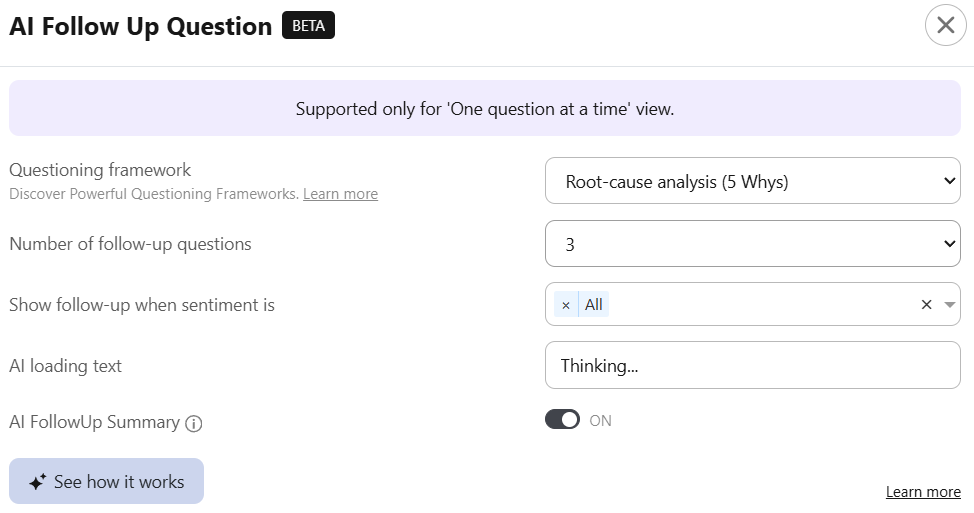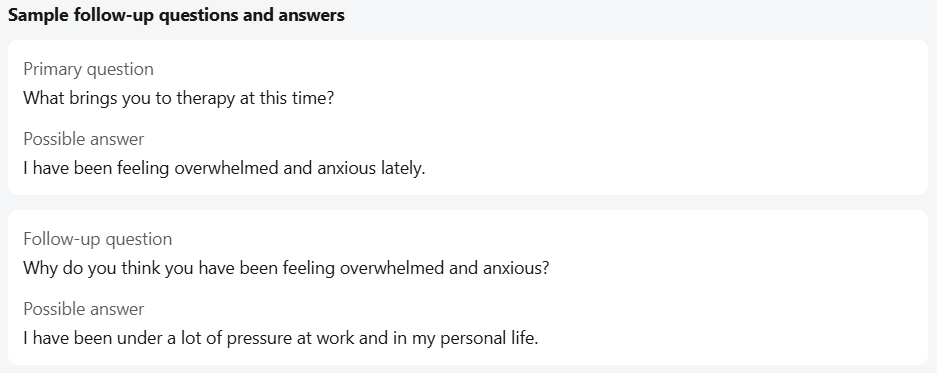Get insights.
Unlock value.
- 14-day free trial
- Set up in minutes
- No credit card required
How Therapists can Use AI Agent for Therapy Intake Form to Personalize Care?
Do you know? 8 out of 10 clients give shallow answers in their first therapy intake form. It’s not just a small hurdle; it’s a roadblock to effective treatment.
Vague answers force therapists to fill in the gaps with guesswork, leading to frustration for both the Therapist and the Client. Clinical indicators may get glossed over, treatment flow is disrupted, and efficiency drops before the first therapy session even begins.
In this case, it is very helpful when an AI agent takes the conversation forward and extract personalized & insightful responses. This feature is called AI Adaptive Questioning or AI adaptive follow-ups.
How AI Adaptive Questioning Gets Personalized Responses?
AI Adaptive Questioning transforms rigid intake forms into dynamic, human-like conversations. It does not stick to a one-size-fits-all script.
- It engages AI to respond in real-time to the clients.
- Skips irrelevant questions and pivots based on client answers.
- Mirrors human conversation, encouraging deeper disclosure and emotional comfort.
The result? More accurate, meaningful, complete & personalized responses.
When clients feel they’re being heard, not interrogated, they’re less likely to abandon the survey halfway. By making every question relevant, Adaptive Questioning shortens the path from form to personalized responses.
How BlockSurvey’s AI Adaptive Questioning Works?
BlockSurvey’s AI adaptive questioning or follow-up provides an option to choose from the following questioning frameworks to guide responses.
- OARS – Open-ended questions, Affirmations, Reflective listening, and Summarizing that draws out meaningful detail from the respondent.
- 5 Whys – Digs deeper into root causes behind symptoms or behaviors, by asking 5 Whys repeatedly on the response received.
- Socratic Method – Encouraging self-reflection and exploration. Challenge assumptions from the response and dig deeper for the original idea.
- Ethnographic Approach – Understanding the client’s context and lived experiences. Includes the client's ethnic and cultural background while questioning.
- ORS (Outcome Rating Scale) – Quantifying client perceptions for progress tracking. Helps track changes and improvements over time.
In the below snapshot, you can find how the BlockSurvey interface provides an option to select a questioning framework during the Adaptive questioning setup. BlockSurvey provides option to select up to 5 follow-up questions.

AI Adaptive Questioning in Therapy Intake Form
When your Therapy intake form asks, ‘What brings you to therapy at this time?’, you can see how naturally the AI takes the conversation forward in the below snapshot.
When the reply is going to be ‘anxious’, it asks a follow-up question like ‘Why do you think you are anxious?’.

Try it yourself
Get a hands-on AI adaptive questioning for the Therapy Intake Form below. The AI continuously adapts as answers come in, ensuring every follow-up is relevant and precise.
Click ‘Get Started’.
Start using BlockSurvey now & start collecting personalized responses in your intake surveys.
Benefits of Using Adaptive Questioning for Therapy Intake
- Personalized Insights – Uncovers deeper emotional and behavioral patterns unique to each client, helping you see the full clinical picture early.
- Client Engagement – Encourages openness and trust, making clients feel heard and understood from the very first intake.
- Efficient Sessions – Minimizes time spent revisiting intake details so you can focus on therapeutic work from session one.
- Targeted Treatment – Quickly identifies underlying issues and priorities, enabling more precise and effective interventions.
- Reduced Repetition – Streamlines questioning to prevent client fatigue and maintain a natural conversational flow.
Conclusion
First impressions matter in therapy. A shallow intake survey can lead to misaligned expectations, missed clinical cues, and slower progress. Adaptive Questioning replaces guesswork with clarity, setting up both therapist and client for a smoother, more productive journey.
Ready to turn intake forms into powerful clinical tools?
Our Affordable Premium Plan offers the AI Adaptive Questioning feature. Try BlockSurvey and experience how adaptive AI can elevate your therapeutic practice from the very first response.
How Therapists can Use AI Agent for Therapy Intake Form to Personalize Care? FAQ
Why are vague answers in therapy intake forms a problem?
Vague responses force therapists to make assumptions, increasing guesswork, missing clinical indicators, and reducing treatment efficiency from the very start.
What is AI Adaptive Questioning in therapy intake forms?
AI Adaptive Questioning is a method where an AI dynamically adjusts questions in real time based on client responses, creating a more natural and personalized intake process.
How does AI Adaptive Questioning reduce survey abandonment in therapy?
By making each question relevant and conversational, clients feel heard instead of interrogated, which lowers the chances of abandoning the form midway.
Get insights.
Unlock value.
- 14-day free trial
- Set up in minutes
- No credit card required


